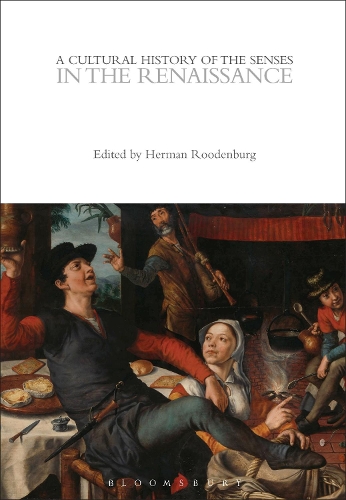
A Cultural History of the Senses in the Renaissance
(Paperback)
Publishing Details
A Cultural History of the Senses in the Renaissance
By (Author) Herman Roodenburg
Bloomsbury Publishing PLC
Bloomsbury Academic
20th September 2018
United Kingdom
Classifications
Tertiary Education
Non Fiction
History of art
Social and cultural anthropology
History of religion
Cultural studies
Sociology
152.109409031
Physical Properties
Paperback
288
Width 169mm, Height 244mm
463g
Description
We know the Renaissance as a key period in the history of Europe. It saw the development of court and urban cultures, witnessed the first global voyages of discovery and gave rise to the Reformation and Counter Reformation. It also started with the invention of oil painting, linear perspective and moveable type, all visual technologies. Does that mean, as has been suggested, that the Renaissance stands for the 'ascendancy of the eye' If so, then what happened to the sensory extremes which the famous Dutch historian Johan Huizinga still perceived in the 15th century Did they simply disappear Or is there another history to be told, a history of a surprising continuity, not only of the sense of hearing but also of the lower senses those of taste, smell and touch And was the Renaissance not first and foremost a time of deep sensory anxiety This volume, assembling nine outstanding specialists, seeks to answer these questions while offering a lively and 'sensational' portrait of the period. A Cultural History of the Senses in the Renaissance presents essays on the following topics: the social life of the senses; urban sensations; the senses in the marketplace; the senses in religion; the senses in philosophy and science; medicine and the senses; the senses in literature; art and the senses; and sensory media.
Reviews
Many of the essays are lavishly illustrated; all are written with elegance and an attentive eye to the volumes potential dual readership, nonspecialists as well as specialists. The collective accomplishment is no small feat, and the result is deeply pleasurable to read while evincing somewhat less of the critical ferment on display in some of the years other studies in adjacent areas. I suspect it will prove a much-appreciated resource in advanced survey courses of the era. * SEL: Studies in English Literature 1500-1900 *
Author Bio
Herman Roodenburg holds the Chair of The Historical Anthropology and Ethnology of Europe at the Free University of Amsterdam and is also affiliated with the Meertens Institute, of the Royal Netherlands Academy of Arts and Sciences. Among his recent English publications are The Eloquence of the Body: Perspectives on Gesture in the Dutch Republic (2004), Forging European Identities, 1400-1700 (2007), Body and Embodiment in Netherlandish Art (2008) and The Passions in the Arts of the Early Modern Netherlands (2010).
